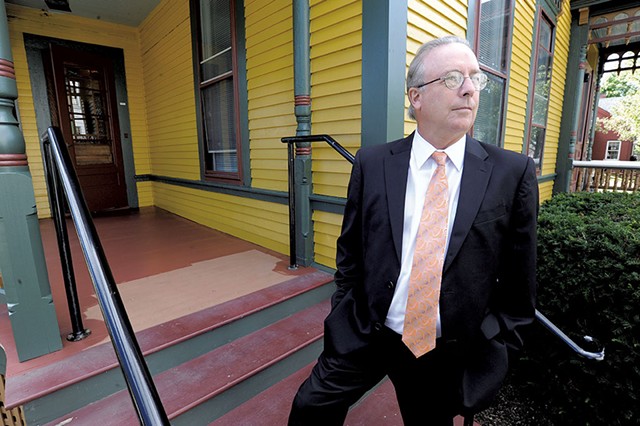
- Jeb Wallace-Brodeur
- Doug Hoffer
Doug Hoffer keeps a running list of every job he's ever had. The document has columns for position, employer, location and dates. It's ordered chronologically, beginning with the summer of '64, when Hoffer, then 12 years old, caddied at a Connecticut golf course.
Asked about the list, Hoffer, 65, responded half-seriously: "Do you really think other people don't do that?"
Entry No. 59 is the post Hoffer has held since January 2013: Vermont state auditor. For a man known for fastidious record keeping and a zealous devotion to data, the elected role is a dream job.
But he has to run for it every two years, and this November the Progressive Democrat has an opponent. Dan Feliciano, who received 4.4 percent of the vote in the 2014 gubernatorial race as a Libertarian, is challenging Hoffer — as a Republican. The business efficiency consultant, who has been working in Mexico, said he plans to start campaigning in earnest next week.
What are they competing for? Armed with a $3.7 million budget, a staff of 14 and subpoena power, the Vermont state auditor acts as a watchdog of state government, preventing waste, fraud and abuse, and ensuring that taxpayer money is spent wisely. Hoffer likes to point out that the office is "truly independent," beholden only to the Vermont citizenry. However, he has no authority to actually compel state officials to follow the recommendations in his audits.
As illustrated by his job list, Hoffer came to the office via an unconventional path. A high school dropout, he worked the counter at McDonald's, delivered flowers and served as the maître d' at the famed Alice's Restaurant in Massachusetts — not to mention several dozen other jobs — before enrolling at Williams College at age 30. He spent more time with his professors than his peers, Hoffer recalled.
After graduating with a political science degree, he went to University at Buffalo School of Law. Rather than take the bar, he applied for just one job and got it: policy analyst at the Community and Economic Development Office in Burlington, under then-mayor Bernie Sanders. Hoffer, who says he's always been drawn to public policy, was impressed with CEDO's progressive approach to economic development, which emphasized local ownership and affordable housing — as opposed to what he called "traditional tax-credit crap."
After five years, he became a self-employed policy analyst whose clients included then-state auditor Ed Flanagan, for whom he led a high-profile review that cast doubt on the effectiveness of the state's Economic Advancement Tax Incentives program. The Peace & Justice Center commissioned him to quantify the cost of living, and working, in Vermont, and his efforts produced the state's first job gap study — a document that has stood up to years of scrutiny. He also did pro bono analyses for Vermont lawmakers, often on economic development programs.
Longtime acquaintances aren't surprised Hoffer ended up in the auditor's office. "As the Catholics would say, this is his calling," said Burlington attorney John Franco, who met Hoffer during the late 1980s when they both worked in city hall.
Freed from the confines of employer supervision, Hoffer has shown he is willing to pursue problems even if they conflict with his political party, make the current administration look bad or enrage powerful business interests.
His office has carried out two audits of the state's infamously beleaguered health care exchange, Vermont Health Connect.
Last year, after investigating Vermont's long-standing leases to ski resorts, he concluded the state was getting a raw deal. The idea of renegotiating the leases died swiftly after an outcry from resort owners and lawmakers representing ski towns.
But much of Hoffer's time has been spent on lower-profile pursuits, analyzing the "nuts and bolts" of government programs. In one audit, his office found that 41 percent of the contracts signed by five agencies and departments during 2015 were awarded without competition, despite state guidelines that no-bid contracts be used only in "extraordinary circumstances."
The state's approach hasn't changed dramatically, according to Hoffer, but he noted that the audit "certainly got people's attention."
During an audit of cellphone plans for state employees, his office discovered that four departments and agencies were paying for more than 5 million unused minutes.
"What does that mean? It means that the decisions about who was going to get a phone and the decisions about which types of plans weren't optimal — to be charitable," Hoffer said in his deep baritone, speaking rapidly yet eloquently. He's also vocal online, where he's "a bit of a keyboard warrior," as Franco phrased it. The auditor has been known to comment on several political blogs and the news site VTDigger.org. Discussion gets heated. "It's fun. It's a hobby," Hoffer explained. "Ninety-nine percent of the things I post are just data, and I hope that improves the discourse. Interestingly, many people vote thumbs-down on facts," he added.
Another Hoffer audit found that the Department of Corrections was paying for excess prescription drugs instead of returning them to pharmacies for reimbursements. The department changed its procedure as a result of the finding and recouped $450,000 for returned medications in the first year and a half after the audit.
Former corrections commissioner Andy Pallito has been on the receiving end of a few other examples of Hoffer's work: One highlighted inaccurate information in the state's sex-offender registry; another found lack of oversight in the transitional housing program for released inmates.
Pallito said some of the findings in the transitional housing audit took him by surprise. "All the information I was receiving at the top was, 'Things are going well,'" Pallito said. Afterward, "We put more resources into oversight and started doing more frequent site visits."
As a result of the sex-offender registry report, the department "changed completely" how it shared information, said Pallito, who now heads up the Department of Finance & Management.
"I find him to be completely fair, and I think he sticks to the facts," Pallito said of Hoffer.
Not all of the auditor's work has been welcomed with open arms. During a review of the tax department's efforts to collect delinquent income taxes, Hoffer concluded that the department didn't have enough data to gauge how effective its collection methods were.
In her written response to the audit, Department of Taxes Commissioner Mary Peterson called it a "snapshot from the rearview mirror." She emphasized that her staff were in the midst of transition to a new IT system that "solves the well-known problems ... that the audit enumerated."
Time hasn't altered Peterson's opinion. In an email last week, she wrote, "The audit was a serious distraction for our staff at a critical time in implementing our modern IT system, VTax."
Not surprisingly, Hoffer has been collecting data to assess his own work, too.
In the nearly four years since he took office, Hoffer and his staff have done 19 performance audits, plus a number of special investigations, in addition to monitoring the financial audits that the private firm KPMG performs for the state.
"If you see a 30-page report, there's probably 400 pages of documentation," Hoffer said. "I have tremendous confidence in everything we say."
How much difference does any of it make? In 2014, one year after auditing the sex-offender registry, the liquor control system and designated agencies, 69 percent of his office's recommendations had been partially or fully implemented, according to the auditor's 2015 performance report. The goal is 50 percent after one year and 75 percent after three years. After that, Hoffer admits, his office doesn't have the resources to keep checking. When a department makes a change as a result of his recommendation, Hoffer said he asks for proof. "Verbal assurances are not sufficient," he added in a follow-up email.
One of Hoffer's central campaign promises doesn't lend itself to a data-driven analysis. While campaigning in 2012, he criticized his predecessor, Tom Salmon, for politicizing the office and pledged to take a nonpartisan approach.
Less liberal lawmakers say he's succeeding. "Sometimes I have to remind myself that he is really progressive politically," said Sen. Dick Sears (D-Bennington.)
Rep. Heidi Scheuermann (R-Stowe) clashed with Hoffer last year over the ski resort issue. But when asked about him last Wednesday, she said, "I think Doug has done a good job as auditor, frankly." She went on, "I have obviously on occasion disagreed with some of his conclusions ... But the audits themselves are good."
Hoffer has come down hard on several of the state's economic development programs, including the Vermont Employment Growth Incentives and the Vermont Training Program, faulting them for being predicated on unproven claims and lacking adequate data to demonstrate their value. "I do have a difference of philosophy with him on economic development," said Sen. Kevin Mullin (R-Rutland) who chairs that committee in the Senate. But, he added, "I respect him a great deal."
Auditing Vermont Health Connect at a time when the Democratic administration was already getting pummeled for its poor rollout won him respect across the aisle. Asked if Hoffer has gone easy on the Democratic administration, Pallito responded emphatically: "Noooo."
Notably, the auditor raised questions about the state's participation in the federal EB-5 program in 2012, long before it erupted in scandal. At the time, he suggested that oversight of the program was insufficient and told Seven Days, "I don't want to hear how great the program is until you can demonstrate it's creating good jobs."
Has studying the innards of state government made him cynical? Hoffer insists it hasn't: "Am I frustrated that it's not more efficient and effective? Of course. But we're trying."
Two terms in, he's still brimming with audit ideas. He recently tallied up how much the state spends on public safety across a number of departments. The total: $376 million dollars. "I'm not saying it's a bad thing," Hoffer said. But he plans to examine whether the spending corresponds with the state's crime trends.
He's also committed to an audit of 10 capital projects, including the psychiatric hospital in Middlesex. "It's a big state government," he said. "We've only scratched the surface."











Comments (3)
Showing 1-3 of 3
Comments are closed.
From 2014-2020, Seven Days allowed readers to comment on all stories posted on our website. While we've appreciated the suggestions and insights, right now Seven Days is prioritizing our core mission — producing high-quality, responsible local journalism — over moderating online debates between readers.
To criticize, correct or praise our reporting, please send us a letter to the editor or send us a tip. We’ll check it out and report the results.
Online comments may return when we have better tech tools for managing them. Thanks for reading.